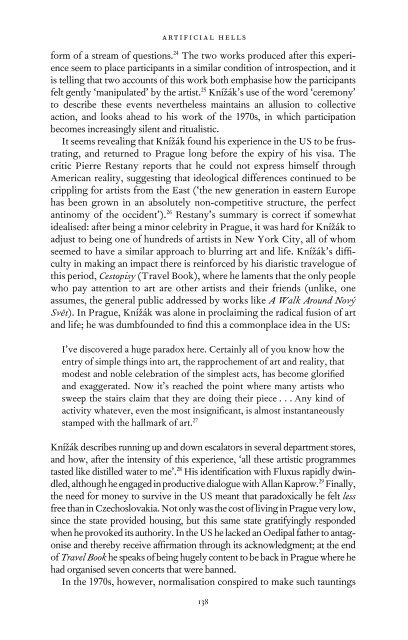Participatory Art and the Politics of Spectatorship - autonomous ...
Participatory Art and the Politics of Spectatorship - autonomous ...
Participatory Art and the Politics of Spectatorship - autonomous ...
You also want an ePaper? Increase the reach of your titles
YUMPU automatically turns print PDFs into web optimized ePapers that Google loves.
artificial hells<br />
form <strong>of</strong> a stream <strong>of</strong> questions. 24 The two works produced after this experience<br />
seem to place participants in a similar condition <strong>of</strong> introspection, <strong>and</strong> it<br />
is telling that two accounts <strong>of</strong> this work both emphasise how <strong>the</strong> participants<br />
felt gently ‘manipulated’ by <strong>the</strong> artist. 25 Knížák’s use <strong>of</strong> <strong>the</strong> word ‘ceremony’<br />
to describe <strong>the</strong>se events never<strong>the</strong>less maintains an allusion to collective<br />
action, <strong>and</strong> looks ahead to his work <strong>of</strong> <strong>the</strong> 1970s, in which participation<br />
becomes increasingly silent <strong>and</strong> ritualistic.<br />
It seems revealing that Knížák found his experience in <strong>the</strong> US to be frustrating,<br />
<strong>and</strong> returned to Prague long before <strong>the</strong> expiry <strong>of</strong> his visa. The<br />
critic Pierre Restany reports that he could not express himself through<br />
American reality, suggesting that ideological differences continued to be<br />
crippling for artists from <strong>the</strong> East (‘<strong>the</strong> new generation in eastern Europe<br />
has been grown in an absolutely non- competitive structure, <strong>the</strong> perfect<br />
antinomy <strong>of</strong> <strong>the</strong> occident’). 26 Restany’s summary is correct if somewhat<br />
idealised: after being a minor celebrity in Prague, it was hard for Knížák to<br />
adjust to being one <strong>of</strong> hundreds <strong>of</strong> artists in New York City, all <strong>of</strong> whom<br />
seemed to have a similar approach to blurring art <strong>and</strong> life. Knížák’s diffi -<br />
culty in making an impact <strong>the</strong>re is reinforced by his diaristic travelogue <strong>of</strong><br />
this period, Cestopisy (Travel Book), where he laments that <strong>the</strong> only people<br />
who pay attention to art are o<strong>the</strong>r artists <strong>and</strong> <strong>the</strong>ir friends (unlike, one<br />
assumes, <strong>the</strong> general public addressed by works like A Walk Around Nový<br />
Svět). In Prague, Knížák was alone in proclaiming <strong>the</strong> radical fusion <strong>of</strong> art<br />
<strong>and</strong> life; he was dumbfounded to fi nd this a commonplace idea in <strong>the</strong> US:<br />
I’ve discovered a huge paradox here. Certainly all <strong>of</strong> you know how <strong>the</strong><br />
entry <strong>of</strong> simple things into art, <strong>the</strong> rapprochement <strong>of</strong> art <strong>and</strong> reality, that<br />
modest <strong>and</strong> noble celebration <strong>of</strong> <strong>the</strong> simplest acts, has become glorifi ed<br />
<strong>and</strong> exaggerated. Now it’s reached <strong>the</strong> point where many artists who<br />
sweep <strong>the</strong> stairs claim that <strong>the</strong>y are doing <strong>the</strong>ir piece . . . Any kind <strong>of</strong><br />
activity whatever, even <strong>the</strong> most insignifi cant, is almost instantaneously<br />
stamped with <strong>the</strong> hallmark <strong>of</strong> art. 27<br />
Knížák describes running up <strong>and</strong> down escalators in several department stores,<br />
<strong>and</strong> how, after <strong>the</strong> intensity <strong>of</strong> this experience, ‘all <strong>the</strong>se artistic programmes<br />
tasted like distilled water to me’. 28 His identifi cation with Fluxus rapidly dwindled,<br />
although he engaged in productive dialogue with Allan Kaprow. 29 Finally,<br />
<strong>the</strong> need for money to survive in <strong>the</strong> US meant that paradoxically he felt less<br />
free than in Czechoslovakia. Not only was <strong>the</strong> cost <strong>of</strong> living in Prague very low,<br />
since <strong>the</strong> state provided housing, but this same state gratifyingly responded<br />
when he provoked its authority. In <strong>the</strong> US he lacked an Oedipal fa<strong>the</strong>r to antagonise<br />
<strong>and</strong> <strong>the</strong>reby receive affi rmation through its acknowledgment; at <strong>the</strong> end<br />
<strong>of</strong> Travel Book he speaks <strong>of</strong> being hugely content to be back in Prague where he<br />
had organised seven concerts that were banned.<br />
In <strong>the</strong> 1970s, however, normalisation conspired to make such tauntings<br />
138
















